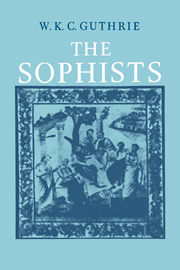Book contents
- Frontmatter
- Contents
- List of Abbreviations
- Preface
- I INTRODUCTION
- II TOPICS OF THE DAY
- III WHAT IS A SOPHIST?
- IV THE ‘NOMOS’ – ‘PHYSIS’ ANTITHESIS IN MORALS AND POLITICS
- V THE SOCIAL COMPACT
- VI EQUALITY
- VII THE RELATIVITY OF VALUES AND ITS EFFECTS ON ETHICAL THEORY
- VIII RHETORIC AND PHILOSOPHY (Seeming and being, believing and knowing, persuading and proving)
- IX RATIONALIST THEORIES OF RELIGION: AGNOSTICISM AND ATHEISM
- X CAN VIRTUE BE TAUGHT?
- XI THE MEN
- Bibliography
- Index of passages quoted or referred to
- General Index
- Index of selected Greek words
V - THE SOCIAL COMPACT
Published online by Cambridge University Press: 05 August 2015
- Frontmatter
- Contents
- List of Abbreviations
- Preface
- I INTRODUCTION
- II TOPICS OF THE DAY
- III WHAT IS A SOPHIST?
- IV THE ‘NOMOS’ – ‘PHYSIS’ ANTITHESIS IN MORALS AND POLITICS
- V THE SOCIAL COMPACT
- VI EQUALITY
- VII THE RELATIVITY OF VALUES AND ITS EFFECTS ON ETHICAL THEORY
- VIII RHETORIC AND PHILOSOPHY (Seeming and being, believing and knowing, persuading and proving)
- IX RATIONALIST THEORIES OF RELIGION: AGNOSTICISM AND ATHEISM
- X CAN VIRTUE BE TAUGHT?
- XI THE MEN
- Bibliography
- Index of passages quoted or referred to
- General Index
- Index of selected Greek words
Summary
Opinions differ as to how far the theory of the social contract, or compact, as understood in the seventeenth and eighteenth centuries A.D., was anticipated in our period of Greek thought, and the differences spring largely from the different meanings which scholars have given to the phrase. We shall look at the evidence first (briefly in some cases where it has already been touched on), and may then, if we wish, see how close the Greek conceptions were to those of later Europe.
One ancient belief about law attributed it ultimately to the gods. The human lawgiver or constitution-maker (whose existence was not denied) was only the channel through which the commands of heaven became known and effective. In Tyrtaeus's poem (seventh century, fr. 3 Diehl) Lycurgus's constitution for Sparta is actually dictated in detail by Apollo at Delphi. Later, men tended to say that Lycurgus drew up the constitution himself but went to Delphi for assurance that it had the god's approval (Xen. Rep. Lac. 8.5). Herodotus (1.65) finds two versions side by side, the traditional one of a religious origin for the laws, and a rationalistic—based on the similarity of Spartan and Cretan laws—that Lycurgus copied the constitution of Crete. The Cretan laws in their turn were said to have been the work of Zeus (Plato, Laws, adinit.). Even Cleisthenes, making his democratic reforms at the end of the sixth century, received the names for his new tribes from the Pythia (Arist. Ath. Pol. 21-6), and probably therefore sought the oracle's ratification of his whole scheme.
By the fifth century an impersonal nature had in some men's minds replaced the gods as the worldwide power that produced the whole order of which men are a part. For others, like Hippias, the two can exist comfortably side by side, and Euripides, when he speaks in ‘Presocratic’ language of the ‘ageless order of immortal nature’, and elsewhere in his poetry, shows a desire to keep them united.
- Type
- Chapter
- Information
- A History of Greek Philosophy , pp. 135 - 147Publisher: Cambridge University PressPrint publication year: 1977



